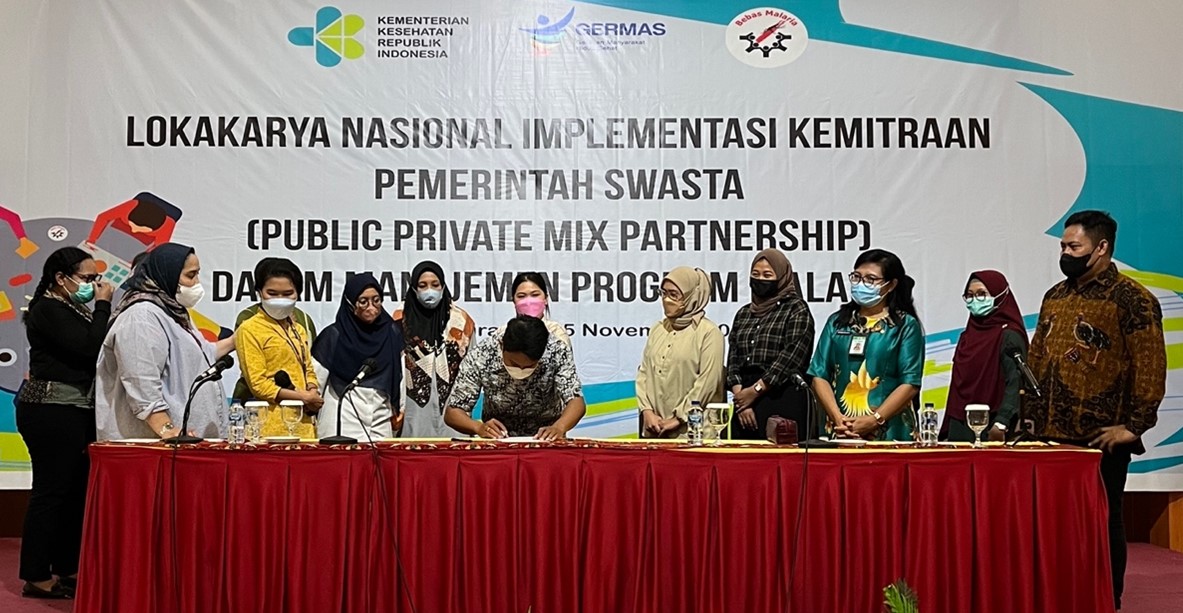Harnessing partnership with private sectors undeniably holds potential to expedite malaria elimination. Yet, this approach also faces obstacles. A primary concern is the provision of substandard antimalarial treatments by untrained healthcare workers and/or inappropriate dispensing of antimalarial drugs. Moreover, the situation is compounded by underreported malaria cases, undermining the collective effort to eliminate the disease. These challenges significantly compromise the overall effectiveness of the malaria elimination strategy.
Indonesia has waged a prolonged battle against malaria and, as of 2022, has accredited 72% of its districts and cities as malaria-free. Despite the achievement, Indonesia clearly needs to address the issue in the endemic regions and prevent malaria's resurgence in previously cleared areas. This emphasizes the significance of partnering with private sectors, encapsulated in the public-private mix (PPM) strategy, as a national approach to malaria elimination. This strategy aims to provide holistic malaria services by actively improving private-sector engagement. With this approach, PSPs are tasked with various responsibilities, including case detection, diagnosis and treatment, referral, transmission prevention and vector control. These efforts prioritize equitability and accessibility, particularly in Indonesia's eastern regions.
Recognizing the merits of engaging with private sectors, the World Health Organization and the Ministry of Health of the Republic of Indonesia have intensified the partnership with PSPs through Memoranda of Understanding (MoU) and the facilitation of a series of workshops. These workshops aim to strengthen collaboration between public-private sectors, enhance quality services, and establish a robust reporting procedure. Additionally, the MoUs foster and strengthen partnerships among public institutions, civil society organizations, and private institutions involved in the malaria programme.

The signing event of a Memoranda of Understanding (MoU) between the Jayapura City District Health Office and private sector entities aimed at ensuring standardized practices for malaria case management. Credits: WHO/Ajib Diptyanusa.
The workshops carried out at the national and sub-national levels from November 2022 – June 2023 in various places, such as Bekasi, Papua, Bali, and East Java provinces to commemorate their achievements in tackling malaria. The workshops invited representatives from various ministries, private sector providers, professional organizations, officials from sub-national, including health offices, hospitals, and clinics, as well as primary health care. The private sector welcomed the initiative, which indicated that more than half (52%) of the participants were coming from private institutions. The workshops addressed the importance of case finding, management, and reporting, as well as building networks and capacity building for health workers to expedite and sustain the elimination status in the region.
Throughout the workshops, participants explored challenges in executing PPM in combating malaria. Private sector expressed concerns that the benefits leaned towards the government. Other major reasons cited were an unclear partnership strategy, unexplored advantages, lack of formal agreements, and misalignment of collaborative action. This lack of engagement is evidenced by 54% of private sector providers that have not yet established partnership with local government in malaria programme.
“Developing public-private partnerships is essential for improving access to quality malaria services. This collaboration also seeks to boost the detection of malaria case in private health facilities and enhance the quality of reporting from these facilities,” said Dr. Hellen Dewi Prameswari, the National Malaria Programme Manager of MoH, during the workshop in Bali.
Engaging with the PSPs is one of the strategies in combatting malaria, particularly in Eastern Indonesia. WHO Indonesia and Ministry of Health initiated these workshops as a platform for stakeholders to strategize and coordinate malaria programmes, identify barriers and form partnerships. PPM initiatives potentially bridge the gaps by providing accessible service delivery, promoting innovation, and pooling resources. This approach accelerates towards eliminating malaria in endemic areas and sustaining efforts in preserve the malaria-free status in elimination areas.
With the signing of MoUs and hosting the workshops, the first steps of public-private partnerships in the fight against malaria were made. Despite the progress, there are several key action plans to maximize these partnerships, such as exploring benefits, aligning the expectation with key stakeholders and devising robust action plans. Above all, these efforts represent a huge leap to malaria elimination in Indonesia.
WHO Indonesia’s malaria programme is supported by the Global Fund to Fight AIDS, Tuberculosis and Malaria.
Written by Dr Ajib Diptyanusa, National Consultant for Malaria, and Dr Herdiana Hasan Basri, National Professional Officer for Malaria; WHO Indonesia.
